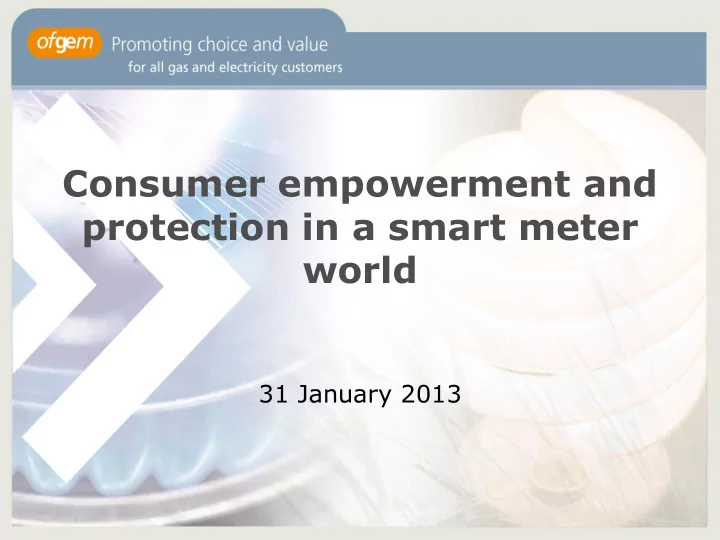

Consumer empowerment and protection in a smart meter world 31 January 2013
Agenda 1. Introductions 10:00 2. Ofgem presentation: intro to the project, purpose of the 10:10 workshop, some example policy questions 3. Energy UK presentation – Frances Williamson 10:30 4. Consumer Focus presentation – Zoe McLeod 10:50 Coffee break 11:10 5. Small group session one: smart opportunities and 11:20 regulatory barriers Lunch 12:20 6. Small group session two: smart risks and regulatory 12:50 protections 7. Wrap-up and next steps 13:50 2
INTRODUCTION TO THE PROJECT 3
Background • Ofgem consulted in December 2011 on a strategy to promote smart energy markets • In July 2012 we published a decision paper: Promoting smarter energy markets: a work programme • This set out four workstreams: – Change of supplier – Electricity settlement – Demand side response – Consumer empowerment and protection 4
Smarter Energy Markets Work Programme Consumer Change of Electricity Demand Side Empowerment Supplier Settlement Response and Protection Objective: Objective: Objective: Create a market environment that Objective: Settlement arrangements that use Regulatory arrangements that supports the efficient, system-wide A fast, reliable and cost effective smart metering data to allocate empower and protect consumers use of DSR, which has the change of supplier process, which energy in an accurate, timely and to participate effectively in smarter potential to reduce bills for will facilitate competition and build cost-effective way, which will retail energy markets, recognising consumers, enhance security of consumer confidence. facilitate product innovation and the opportunities and risks supply, and contribute to efficient use of energy. involved. sustainable development. 5
Related Ofgem Projects Smarter DECC Energy RMR Smart Smart Smart Grids Markets (Retail Meter Metering Project Programme: Market Implement n (Rollout) Review) Programme Consumer DSR Change of Supplier Settlement 6
Consumer Empowerment and Protection Project Objective: regulatory arrangements that empower and protect consumers to participate effectively in smarter retail markets timeline Winter Spring Summer Autumn Winter Spring 2012/13 2013 2013 2013 2013/14 2014 … Decision Scoping and policy development: document • Stakeholder engagement setting out • Identifying policy issues workplan • Identifying Ofgem’s role in relation to those • Prioritising those issues • Preparing consultation paper Consultation Begin carrying on our out detailed proposed workplan – policy issues 2014 – 201x and priorities 7
PURPOSE OF WORKSHOP 8
Purpose of Workshop Input and help from you: • Identifying key opportunities for consumers • Identifying how the existing regulation might create barriers to achieving those • Identifying the important risks for consumers • Identifying how the regulatory arrangements may need to change to provide protection from those risks • Prioritising those regulatory changes 9
SOME EXAMPLE POLICY QUESTIONS 10
Advice on best tariffs Opportunity: • Consumers receive accurate advice on the best tariffs for them, based on their accurate consumption data. Risks: • Complexity of data and of tariffs making it difficult for consumers to find the best tariffs without specialist advice. • Complexity for consumers providing their consumption data to switching sites, other suppliers, or other third parties. • Increased complexity for switching sites, new suppliers or third parties making recommendations on more complex data and tariffs. Policy questions: • What role should the Confidence Code play in relation to calculations of future consumption based on smart data? • What role should the regulatory framework play in ensuring consumers receive estimates of future consumption based on smart meter data? • How should this area develop alongside the RMR proposals? 11
Energy Services Opportunities: • New, innovative services. • Increased competition in the energy sector. • Bundled deals offering good services to consumers across a range of products. Risks: • Energy services largely unlicensed – does this mean consumers are largely unprotected? • Licensing requirements for suppliers may restrict innovation. Policy questions: • How should Ofgem balance consumer protection with freedom to innovate? • How should energy services fit within the regulatory framework in the future? • Does existing regulation on suppliers limit the role they can play in energy services? • Are energy services companies limited in the services they can offer without becoming suppliers? 12
[ENERGY UK PRESENTATION] 13
[CONSUMER FOCUS PRESENTATION] 14
SMALL GROUP QUESTIONS 15
Outline of Small Group Sessions Two small group sessions: • Opportunities, and regulatory barriers • Risks, and regulatory protections 16
Opportunities • What are the opportunities for consumers that smart meters bring? • What regulatory barriers might prevent those opportunities occurring, or otherwise impede the innovation? • What are the top three priorities for regulatory change? 17
Risks • What are the risks for consumers from smart meters and smart-related developments? • What regulatory changes could Ofgem take to protect consumers from those risks? • What are the top three priorities for regulatory change? 18
WRAP UP 19
20
Recommend
More recommend